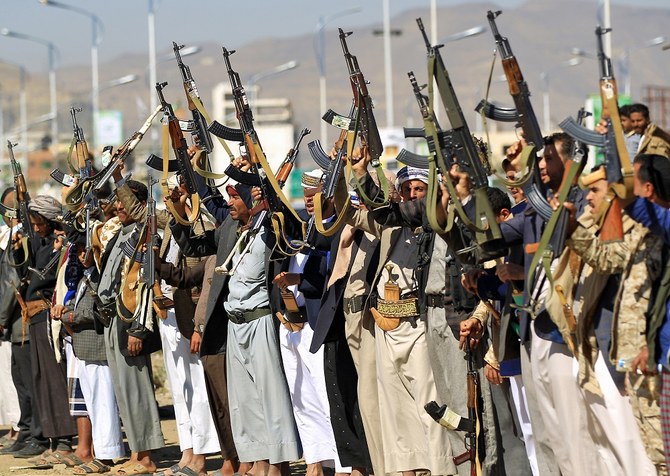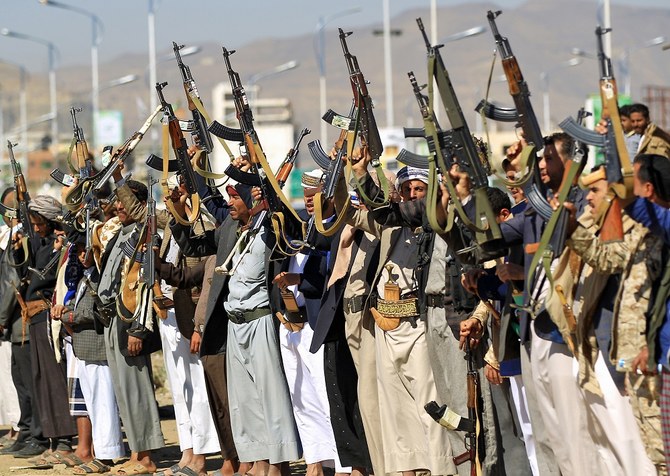AL-MUKALLA: The Iran-backed Houthis have laid siege to thousands of civilians inside a government-controlled area in the central province of Marib.
Intensifying fighting for the energy-rich city of Marib has killed dozens of combatants during the past 24 hours.
Local government officials told Arab News on Monday that the Houthis besieged Al-Abedia area, south of Marib province, after their forces scored a string of territorial gains following a rapid assault on government troops, preventing people, including the sick, from leaving or entering the area.
“We have not been able to deliver humanitarian assistance to the 5,106 besieged families and children as the militias blocked roads and prevented them from even leaving for medical treatment,” Khaled Al-Shajani, the head of Marib’s office of the internationally recognized government’s Executive Unit for IDPs Camps, told Arab News by telephone.
He urged international organizations and powerful countries to pressure the Houthis to lift their siege and stop military operations to allow civilians to leave their homes.
The government official said that more than 1,043 families had also left homes in Hareb district, southeastern Marib, and sheltered in the city of Marib since earlier this month. This was adding more pressure to the large displacement camps in Marib that host more than 2 million people, he said.
Local military officials and media reports said on Monday that heavy fighting broke out between the Houthis and government troops in Al-Mashjah, Al-Kasarah, Hareb, Jabal Murad and Serwah as the Houthis escalated ground attacks and artillery fire on government troops defending the city of Marib.
Dozens of combatants, most of them Houthis, have been killed in the fighting or in airstrikes by Arab coalition warplanes.
“There are martyrs from the national army, but the Houthi deaths are much bigger,” a military official, who preferred to remain anonymous, told Arab News, noting that hundreds of Houthis have been killed since the weekend.
Yemeni officials say that they cannot put a number on Houthi deaths as most of the rebels are killed by the coalition’s warplanes behind the frontline or even before taking part in the fighting. The latest round of fierce fighting in Marib began in February when the Houthis renewed a major military offensive to seize control of the government’s last bastion in the densely populated northern half of the country.
The local authority in the northern province of Hajjah said that the death toll from the Houthi missile strike on a flame-lighting ceremony in Medi town on Saturday had risen to 12 people, including three military and security officials. The Houthis fired a ballistic missile on Saturday night at a gathering of government officials and civilians marking the 59th anniversary of the Sept. 26 revolution.
Another ballistic missile hit the city of Marib, destroying the house of the governor of Marib, Sultan Al-Arada.
The increase in fighting in Marib comes as government-controlled areas continue to record a high number of coronavirus infections.
The Aden-based national coronavirus committee on Monday announced 54 new cases, nine deaths and 42 recoveries in government-controlled areas, bringing the total number of cases to 8,988, including 1,703 deaths and 5,570 recoveries.
Houthis besiege thousands of civilians in Marib’s Al-Abedia
https://arab.news/24cnq
Houthis besiege thousands of civilians in Marib’s Al-Abedia

- Local government officials told Arab News that the Houthis besieged Al-Abedia area, south of Marib province
Hamas says Israeli strike kills political bureau official Salah Al-Bardawil

- Bardawil, 65, was killed along with his wife in a camp in Al-Mawasi, near Khan Yunis
- He is the third member of the political bureau to be killed since Israel resumed air strikes on Tuesday
GAZA CITY: Palestinian group Hamas confirmed on Sunday that Salah Al-Bardawil, a senior member of its political bureau, was killed in an Israeli air strike in southern Gaza the previous day.
Bardawil, 65, was killed along with his wife in a camp in Al-Mawasi, near Khan Yunis, according to the Palestinian Islamist movement.
He is the third member of the political bureau to be killed since Israel resumed air strikes on Tuesday, after Yasser Harb and Essam Al-Dalis, the head of the Hamas government in the Gaza Strip.
The Israeli military confirmed Sunday that it had targeted Bardawil, saying that “as part of his role, (he) directed the strategic and military planning” of Hamas in Gaza.
His “elimination further degrades Hamas’ military and government capabilities,” it added.
Bardawil, born in the Khan Yunis refugee camp, joined Hamas when it was founded in 1987, serving as a spokesman before rising through the ranks and being elected to the political bureau in 2021.
He spoke against security cooperation between the Palestinian Authority and Israel, and supported armed struggle against Israel.
Detained by Israel in 1993 and interrogated for 70 days, according to Hamas, Bardawil was also arrested several times by the security forces of the Palestinian Authority.
In the flare-up since last week, Hamas has also announced the deaths of interior ministry head Mahmud Abu Watfa, and Bahjat Abu Sultan, the director general of the Internal Security Services.
Hamas sources said on Sunday that Mohammed Hassan Al-Amur, the bodyguard of slain leader Yahya Sinwar, was killed in an overnight strike on his home in Khan Yunis.
Hamas has been considerably weakened by the deaths of many of its leaders, both inside and outside the Gaza Strip, since the start of the war triggered by its deadly attack on Israel on October 7, 2023.
The head of Hamas’s political wing, Ismail Haniyeh, was killed in Tehran on July 31, 2024, in an explosion claimed by Israel. His successor Sinwar died on October 16 in Gaza.
First Jordanian flight lands in Syria’s Aleppo International Airport after relaunch

- Maintenance and restoration work allows air traffic to and from Aleppo to resume
- Jordanian delegation on flight aims to enhance cooperation between Syria and Jordan
LONDON: The first Jordanian flight landed at Aleppo International Airport in northern Syria on Sunday after the airport’s relaunch last week.
The Jordanian flight carried an official delegation whose aim is to enhance cooperation between Syria and Jordan, reaffirming the revival of civilian activity at the airport, the SANA agency reported.
Last week, Aleppo airport reopened for flights after nearly three months of closure caused by the offensive by rebel groups against Bashar Assad’s regime in early December. Aleppo is the country’s second-largest city after the capital and an important industrial and trade center.
Maintenance and restoration work by Syrian authorities allowed air traffic to and from Aleppo to resume. Authorities announced that Aleppo will begin receiving international flights, facilitating the return of nearly 10 million Syrian refugees currently living in Turkey and Europe. It will also enable local and foreign investors to visit the city, SANA added.
In January, international flights to and from Damascus resumed for the first time since the fall of Assad with a direct flight from Doha — the first in 13 years.
UAE, Egyptian presidents discuss strengthening fraternal ties

- El-Sisi hosts Cairo iftar banquet in honor of Sheikh Mohamed
LONDON: Sheikh Mohamed bin Zayed Al-Nahyan, the president of the UAE, discussed regional development and brotherly ties with the president of Egypt, Abdul Fattah El-Sisi, in Cairo.
The two leaders met on Saturday to discuss their countries’ relations and ways to enhance cooperation in the development, economic, and investment sectors to serve mutual interests, the Emirates News Agency reported.
They confirmed their commitment to enhancing the strong relationship between Abu Dhabi and Cairo while promoting collaboration in all areas.
El-Sisi hosted an iftar banquet in honor of Sheikh Mohamed and the accompanying UAE delegation, composed of senior Emirati officials, the agency added.
Sheikh Mohamed left Egypt on Saturday evening from Cairo International Airport, where the Egyptian president and several senior officials bid him farewell.
Palestinians denounce Israeli recognition of new West Bank settlements

JERUSALEM: The Palestinian foreign ministry condemned on Sunday an Israeli decision to recognize more than a dozen new settlements in the occupied West Bank, upgrading existing neighborhoods to independent settlement status.
The decision by Israel’s security cabinet was a show of “disregard for international legitimacy and its resolutions,” said a statement from the Palestinian Authority’s foreign ministry.
The West Bank, occupied by Israel since 1967, is home to about three million Palestinians as well as nearly 500,000 Israelis living in settlements that are illegal under international law.
Israel’s Finance Minister Bezalel Smotrich, a far-right leader and settler who was behind the cabinet’s decision, hailed it as an “important step” for Israeli settlements in the West Bank.
Smotrich is a leading voice calling for Israel to formally annex the West Bank — as it did in 1967 after capturing east Jerusalem in a move not recognized by most of the international community.
“The recognition of each (neighborhood) as a separate community... is an important step that would help their development,” Smotrich said in a statement on Telegram, calling it part of a “revolution.”
“Instead of hiding and apologizing, we raise the flag, we build and we settle,” he said.
“This is another important step toward de facto sovereignty in Judea and Samaria,” added Smotrich, using the Biblical name for the West Bank.
In its statement, the Palestinian foreign ministry also mentioned an ongoing major Israeli military operation in the northern West Bank, saying it was accompanied by “an unprecedented escalation in the confiscation of Palestinian lands.”
The 13 settlement neighborhoods approved for development by the Israeli cabinet are located across the West Bank. Some of them are effectively part of the bigger settlements they belong to while others are practically separate.
Their recognition as separate communities under Israeli law is not yet final.
Hailing the “normalization” of settlement expansion, the Yesha Council, an umbrella organization for the municipal councils of West Bank settlements, thanked Smotrich for pushing for the cabinet decision.
According to EU figures, 2023 saw a 30-year record in settlement building permits issued by Israel.
Lebanon says one dead as Israel resumes strike on south

- The NNA also reported separate Israeli strikes on Sunday on Naqurah, Shihin and Labbouneh in the south
BEIRUT: Lebanon’s health ministry said one person was killed Sunday in an Israeli drone strike, a day after the most intense escalation since a November ceasefire in the war with Hezbollah.
“The Israeli enemy raid with a drone on a car in Aita Al-Shaab led to the death of one citizen,” the health ministry said, after the official National News Agency (NNA) had reported the strike on the southern village.
The NNA also reported separate Israeli strikes on Sunday on Naqurah, Shihin and Labbouneh in the south, near the Israeli border.
Saturday saw the most intense escalation since a November ceasefire halted the war between Israel and Iran-backed militant group Hezbollah.
The Lebanese health ministry said seven people were killed on Saturday, including in an attack on Tyre which a security source told AFP targeted a Hezbollah official.
Israel said the strikes were “a response to rocket fire toward Israel and a continuation of the first series of strikes carried out” in southern Lebanon.
Hezbollah denied any involvement in the rocket attack, and called Israel’s accusations “pretexts for its continued attacks on Lebanon.”
The November ceasefire brought relative calm after a year of hostilities, including two months of open war, between Israel and Hezbollah.
Israel has continued to strike Lebanon after the ceasefire, targeting what it said were Hezbollah military sites that violated the agreement.
Under the ceasefire, Hezbollah is supposed to pull its forces north of the Litani River, about 30 kilometers (20 miles) from the Israeli border, and dismantle any remaining military infrastructure in the south.
Israel is supposed to withdraw its forces across the UN-demarcated Blue Line, the de facto border, but has missed two deadlines to do so and continues to hold five positions it deems “strategic.”






















